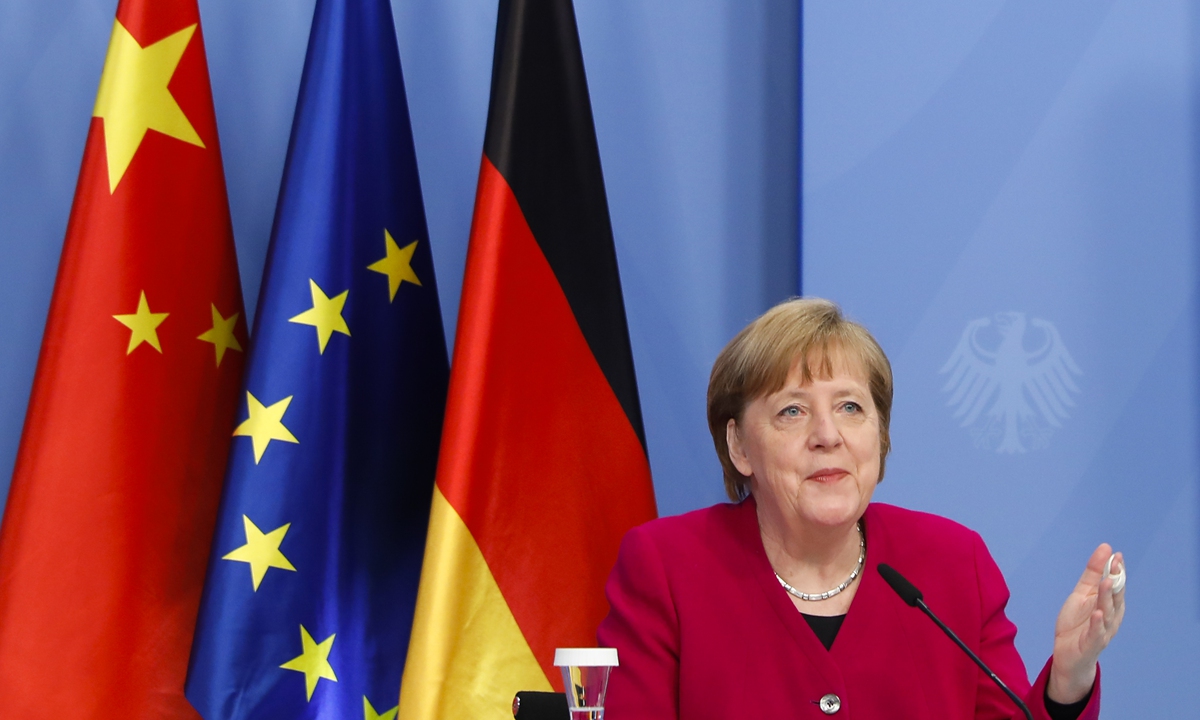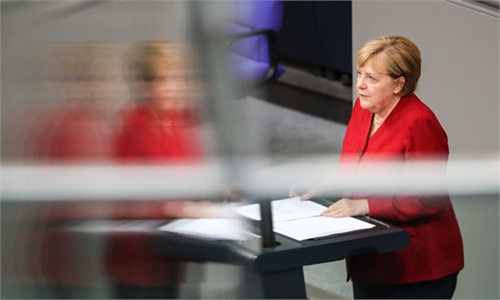
German Chancellor Angela Merkel attends virtual talks as part of the Sixth German-Chinese Government Consultations on April 28, 2021 in Berlin, Germany. Chinese Premier Li Keqiang and German Chancellor Angela Merkel co-chaired the sixth round of intergovernmental consultations via video link on Wednesday. Photo: VCG
The curtain has fallen on German general election with left-leaning Social Democratic Party (SPD) and center-right Christian Democratic Union (CDU), the two major political parties in the country, winning relatively more support.
The CNN quoted the Federal Returning Officer website said the SPD won 25.7 percent of the vote, followed by the CDU/CSU (Christian Social Union) bloc which garnered 24.1 percent, and the Green Party with 14.8 percent of votes. It shows the fragmentation in the German political arena. Some observers say that Germany's first three-party coalition is due to start soon, which is rarely seen in the country. German politics may enter a new era. The division between the left and right will be more obvious, and the politics will be more diversified. Germany is heading toward an exploratory period in politics.
Under various changes, who can lead Europe after Angela Merkel steps down has attracted people's eyeballs. Many people believe France's opportunity has come. But historically, it is impossible for Europe to rely on France or Germany alone. These two most powerful countries in the European Union (EU) must reach a consensus to be able to push the EU forward.
France has always had the ambitions and assets of a major power. France is more daring to put forward bold opinions to promote European strategic autonomy and diplomacy.
Although Paris feels it has been "stabbed in the back" over the AUKUS deal, it still reflects France's importance in Europe. The first half of next year will be an important juncture for France in establishing its image as a leader in Europe. In the first half of next year, France will carry out internal reforms and also assume the rotating presidency of the EU. Questions of integrating the overall situation France faces, both at home and abroad, to gain more momentum of development will be very important to France.
However, Paris has ideas but it lacks money. This determines that France may play a leading role in strategic vision, security and diplomacy, but it needs Germany's strong cooperation to promote specific issues such as European integration.
For now, both Merkel's CDU ally Armin Laschet and SPD leader Olaf Scholz remain relatively united in their support of Merkel's European policy. They say Germany will continue to play a role in Europe. But without a vigorous politician like Merkel, the way Germany functions may change. Beside, France will witness its presidential election next year and Macron will also confront domestic challenges. The EU will have to wait for the two big countries to sort out their domestic problems and retune their relations.
The problem with the EU is that it has not really worked as a united force because it is fragmented in the face of many problems. The EU is also trying to emphasizes the need for a unified voice and a coherent position by adjustments in rules within the union. In this way, the EU's position and influence will be further enhanced, at least diplomatically.
However, due to its global strategy, Europe's transatlantic ally, the US, is not willing to accept or allow the existence of a strong and independent Europe. While fulfilling its own strategic goals, Washington wants to ensure that Brussels is under US control. Therefore, it has been roping in, dividing, and controlling Europe. As the uncertainties in Germany and France increase, so will the contests of different forces within Europe. This is in line with the US wish toward Europe: Brussels should serve Washington's global strategy without posing a competitive threat to it. The US will still spare no effort to influence Europe.
In recent years, Europe's attitude toward China has been influenced by the US. During the Merkel administration, Germany took a more pragmatic stance in terms of its relationship with China. This has, in turn, influenced some of the EU's decisions toward China to a certain extent. However, as the post-Merkel era approaches, ideological factors may play a greater role in China-Germany relations, and a multi-party coalition will complicate Berlin's voice toward Beijing. In this regard, China needs to be patient and continue to stick to an approach that is favorable for China, Germany, and the EU.
The article was compiled by Global Times reporter based on an interview with Cui Hongjian, director of the Department of European Studies, China Institute of International Studies. opinion@globaltimes.com.cn

